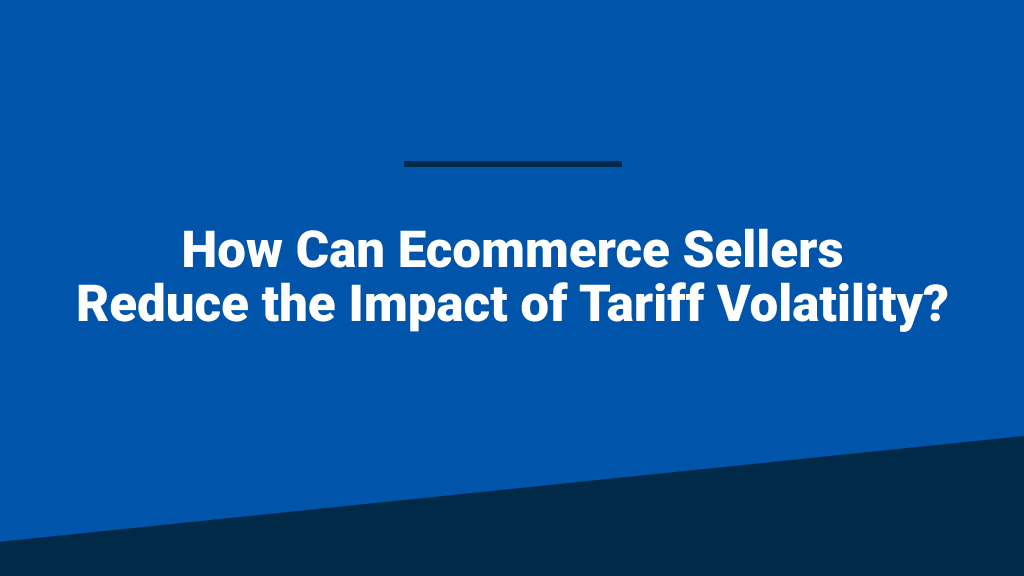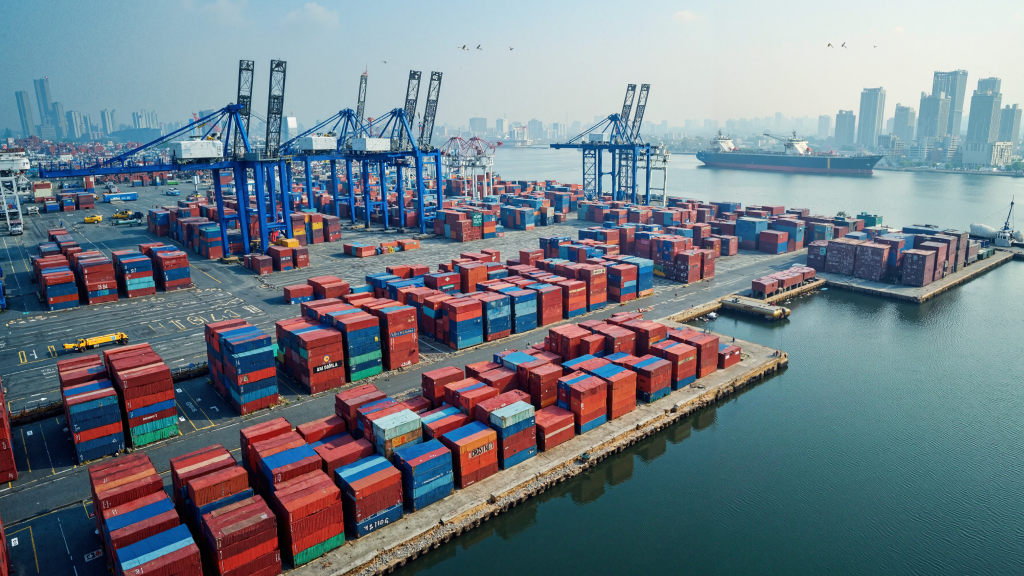
- Tariff volatility has been and will continue to be a major theme in 2025. Tariffs have been announced and rescinded in most countries and could dramatically impact US businesses.
- Descartes Sellercloud enables ecommerce sellers to manage their vendors better and reduce business expenses in several ways that can help reduce the impact of tariffs.
At the beginning of 2025, sweeping tariffs were implemented on Chinese imports. These tariffs could have significant consequences for US ecommerce businesses. According to the website of the Office of the United States Trade Representative, an estimated $582.4 billion worth of trade happened between the US and China in 2024.
However, tariff volatility didn’t stop there. In April 2025, tariffs were announced in many countries on top of tariffs already active on Canadian and Mexican imports. While a 90-day pause was quickly put in place and tariffs were reduced to 10% in most countries, tariffs on Chinese-produced goods remained and were increased to 145%.
Regardless of where goods are produced, tariff volatility will likely continue to dominate the news this year and impact how ecommerce sellers import and source products. However, even before 2025, tariffs were a concern for businesses. In 2024, Descartes and SAPIO Research surveyed 978 supply chain leaders in North America, Europe, South America, and Asia. They found that 48% believe trade barriers and tariffs are their biggest challenge.
In this article, we will examine effective ways to reduce the impact of tariffs and how Descartes Sellercloud and other Descartes products can make tariff volatility more manageable.
4 Ways Ecommerce Businesses Can Reduce the Impact of Tariffs

Ecommerce businesses can take steps to reduce the risk of tariffs. Here are four useful things you can do.
1. Restructure Your Supply Chain
The most difficult but effective way of reducing the impact of tariffs is to restructure your supply chain and order from less impacted vendors. There are a lot of uncertainties with this option, and it can put your business at risk if you cannot locate a dependable supplier.
You also need to consider that the current tariff situation can change quickly. Any progress made will be wasted if new tariffs are introduced to the country where you moved your supply chain.
Descartes MacroPoint™ can provide visibility and control of your supply chain. Find out more here.
2. Use Bonded Warehousing to Delay Tariff Payments
Bonded warehouses are situated near ports and are usually operated by government authorities. It is where imported goods can be temporarily stored until moved to their next location.
Using bonded warehousing will not make tariffs go away, but they can give you more control over when they are paid. With bonded warehousing, duties are not paid when the goods are imported but when they leave the warehouse.
Bonded warehousing could be beneficial if you have cash flow issues because of the increased costs of goods. It can give you time to get the money needed to pay duties or remove a smaller amount of inventory that you can afford to pay.
Considering how frequently the tariff situation changes, there is always the chance that tariffs could be reduced or removed entirely by the time your goods move from the warehouse.
3. Move Your Business to a Foreign Trade Zone (FTZ)
Foreign trade zones (FTZs) were set up during the Great Depression to protect vital industries from tariffs and other fees. FTZs are set up in and around ports of entry and can be found in all 50 states.
However, several things must be considered before moving your business to an FTZ. Relocating your business will be costly and there would likely be start-up fees to pay. Furthermore, you must apply to the Foreign Trade Zone Board, which can take a year for the application to be reviewed and could end up being rejected.
Learn more about how Descartes can help your business manage FTZ and bonded warehouse operations here.
4. Ask Your Vendors to Pay Delivery Duties
It is possible to request that vendors pay your business’s import fees, including tariffs, and that you only pay for the price of the goods.
However, there is a good chance your supplier won’t agree to pay your tariffs as it will be an unnecessary expense for them. They might only agree to such terms if they don’t have many customers or your business orders large quantities.
For more on mitigating tariff volatility, read this comprehensive article by Simran Sethi, Descartes Global Trade Intelligence Product Manager.
How Descartes Sellercloud Can Help Sellers Better Manage Costs?

Descartes Sellercloud can help you better manage your vendors and costs in whatever industry you sell.
With Descartes Sellercloud’s vendor management features, you can manage vendor information, such as products, prices, offers, quotes, and payment terms. If you have several vendors that sell the same product, you can easily see which is the cheapest and which you’ll have to pay tariffs on, etc., to ensure you always use the most convenient.
Some vendors may have unit discounts, and you can add notes to vendor profiles to keep track of various things, such as your strategy when dealing with a specific vendor.
Descartes Sellercloud also helps you manage and reduce costs in several ways:
- Shipping. Easily rate shop the most convenient and affordable shipping prices and lower your shipping expenses.
- Automations. Automate your manual processes to cut out tedious processes, saving time, reducing costly errors, and reducing the workload.
- Reporting. Review your expenses and make informed decisions on how to reduce unnecessary costs.
- Price management. Make use of several repricers integrated with Sellercloud to keep your prices competitive.
- 350+ ready-made integrations. Integrate a wide range of services and tools and make Descartes Sellercloud your central point for ecommerce operations.
- Customization. Descartes Sellercloud is highly customizable, allowing businesses to create custom rules and integrations. This enables your business to operate how it needs and provides you with the flexibility to react to changing economic situations.
In addition to the above, Descartes Sellercloud is a complete ecommerce solution, removing the need for multiple solutions for different processes. We also charge a monthly subscription based on order volume so no hidden fees.
Watch this client success story below from Aquatop to see how Descartes Sellercloud helped them manage their costs.
Do you want to learn how Descartes Sellercloud can help you manage vendors and costs better? Schedule a free demo today.
Lastly, Sellercloud has joined forces with Descartes, experts in advising clients on dealing with tariffs. Find out more about Descartes’ duty and tariff data solutions here.
Key Points
- Tariff volatility is a pressing concern for many businesses. Based on recent research, 48% of supply chain leaders in North America, Europe, South America, and Asia consider tariffs a challenge. With the tariff situation changing regularly, many ecommerce businesses are worried about the impacts.
- Ecommerce companies can manage tariffs better by restructuring their supply chain, negotiating with vendors, moving their business to an FTZ, and using bonded warehousing.
- Descartes Sellercloud enables sellers to manage their vendors’ relationships and costs more effectively, helping them remain reactive in the world of changing tariffs.
- Descartes has a range of solutions to help businesses better manage duties and tariffs, manage FTZ and bonded warehouse operations, and monitor and control supply chains.




